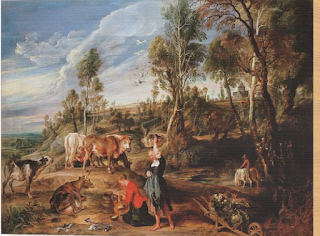Alexander Pope was an 18th-century English poet. He is best known for his satirical verse, including Essay on Criticism, The Rape of the Lock and The Dunciad, and for his translation of Homer. He is the second-most frequently quoted writer in The Oxford Dictionary of Quotations after Shakespeare.(Wikipedia)
Image taken from fine art America.
Ode on Solitude.
Happy the man, whose wish and care
A few paternal acres bound,
Content to breathe his native air,
In his own ground.
Whose herds with milk, whose fields with bread,
Whose flocks supply him with attire,
Whose trees in summer yield him shade,
In winter fire.
Blest! who can unconcern'dly find
Hours, days, and years slide soft away,
In health of body, peace of mind,
Quiet by day,
Sound sleep by night; study and ease
Together mix'd; sweet recreation,
And innocence, which most does please,
With meditation.
Thus let me live, unseen, unknown;
Thus unlamented let me die;
Steal from the world, and not a stone
Tell where I lie.
This poem was written when Alexander Pope was about twelve years of age. It is his earliest poem which still survives. Surprisingly, it's actually quite good. It is written in ABAB throughout it, like most of Pope's other works. In this writing, Pope is basically saying that he likes being alone. He can do many things, like study, sleep, and have other unmentionable fun. It's as if he longs for it and wishes to spend the rest of his life alone as well as his death. In this instance, the title is quite telling. "Ode On Solitude". He is definitely praising it.
Source https://www.poemofquotes.com/alexanderpope/solitude.php
Image taken from fine art America.
Ode on Solitude.
Happy the man, whose wish and care
A few paternal acres bound,
Content to breathe his native air,
In his own ground.
Whose herds with milk, whose fields with bread,
Whose flocks supply him with attire,
Whose trees in summer yield him shade,
In winter fire.
Blest! who can unconcern'dly find
Hours, days, and years slide soft away,
In health of body, peace of mind,
Quiet by day,
Sound sleep by night; study and ease
Together mix'd; sweet recreation,
And innocence, which most does please,
With meditation.
Thus let me live, unseen, unknown;
Thus unlamented let me die;
Steal from the world, and not a stone
Tell where I lie.
This poem was written when Alexander Pope was about twelve years of age. It is his earliest poem which still survives. Surprisingly, it's actually quite good. It is written in ABAB throughout it, like most of Pope's other works. In this writing, Pope is basically saying that he likes being alone. He can do many things, like study, sleep, and have other unmentionable fun. It's as if he longs for it and wishes to spend the rest of his life alone as well as his death. In this instance, the title is quite telling. "Ode On Solitude". He is definitely praising it.
Source https://www.poemofquotes.com/alexanderpope/solitude.php

Comments
Post a Comment